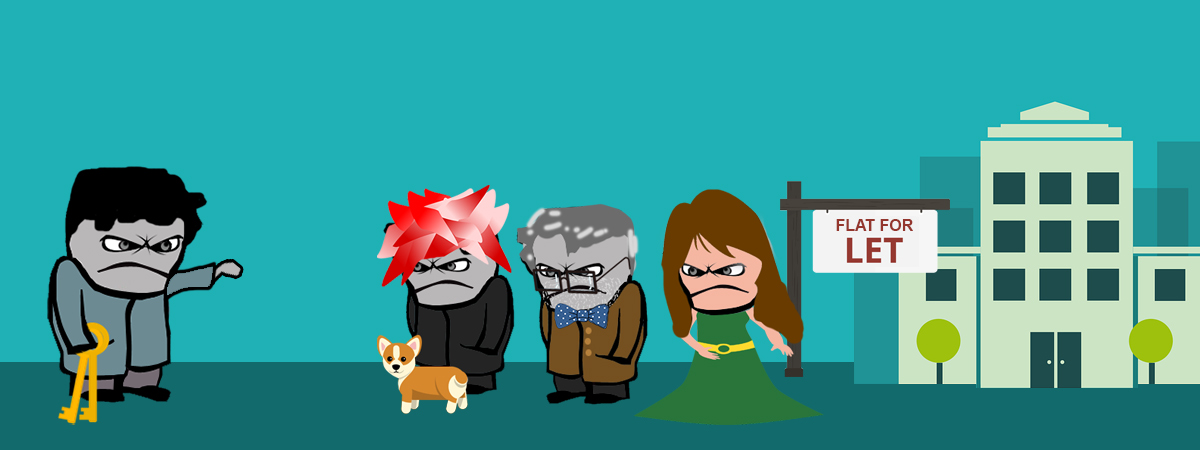
In July 2020, a Judge ruled it unlawful (on the basis of breaching Equality laws) for landlords and letting agents to flaunt “NO DSS” signs in their shop windows and adverts, as well as rejecting tenancy applications from anyone purely because they’re in receipt of housing benefit, as was common practise.
Although the ruling does not set a legal precedent, it is an issue landlords and letting agents should be wary of, both practically and ethically. However, landlords are still entitled to choose the most suitable applicant for their property, so is it discrimination for landlords to choose the applicant with the strongest financial position? I really don’t see how it can be.
Why it’s easy not to pick DSS tenants applicants…
The reality is, rightly or wrongly so, it’s easy to build a practical case for why landlords should pick non-DSS tenants over DSS claimants. With that said, it’s really tough to find the usefulness in the “NO DSS” ban, because even if landlords are forced to accept applications from housing benefit claimants, I think it would be quite easy for landlords to justify their reason for picking a non-DSS tenant.
- This is NOT a charity
Being a landlord is NOT a charity based organisation, it’s a business based on profit. I think that’s what most DSS tenants fail to appreciate. Our job is to secure suitable/reliable tenants.A major aspect of running a successful business is “risk-assessment” Some tenants have higher risk than others and we just want to minimize our risk. For example, a bank is unlikely to authorise a loan to someone receiving benefits. Is that discrimination or is it a decision based on risk-assessment?
Yes, even the lower-risk tenants can cause problems. And yes, the higher-risk (DSS tenants) can be the best tenants in the world. But this is about minimising risk. This type of risk-assessment is practised by almost every business in some shape or form, but more relevantly, businesses that deal with credit and insurance.
Landlords don’t refuse DSS tenants because they hold personal grudges. They generally refuse DSS tenants based on their undeniable financial circumstances. No one is ASSUMING DSS tenants have financial difficulties, it’s the exact reason why they’re receiving financial aid.
ANYONE running a business (regardless of whether they’re receiving Housing Benefits or not) will try to minimize their risks, so it alludes me that people fail to understand that concept when it’s regarding Landlords and DSS tenants.
- It’s NOT like racism
The whole argument that refusing DSS tenants is on the same par as discriminating against a race is ridiculous; it’s almost not worth defending. But I will, because the statement is silly, and I’m in a silly mood (I suspect that comment will come back to haunt me if/when the protesters attack).The financial status of a tenant has a direct impact of how they may affect MY business, someone’s race DOES NOT. So no, those analogies are nothing alike in the current context; so you can stick the “race card” up your anal-passage.
Find me a family with an employed Asian wife with an employed black husband, with a mixed race baby, and I’ll happily give them tenancy. Find me a family with the same racial statuses that are unemployed, and I won’t be so willing.
- Difficult to get insurance
Most Landlord Insurance companies refuse to insure landlords with DSS tenants. The very few that do cover DSS tenants have a high premium. Why? Because at some point or another, statistics signified that a high portion of landlord claimants had DSS tenants.So the root of the problem is far deeper than landlords simply refusing refusing DSS tenants; it’s also based on the fact we can’t get the proper protection policies in place to secure our investments when giving tenancies to DSS tenants.
- Mortgage restrictions
Some lenders don’t allow landlords to let to tenants on Housing Benefits. So not only is it difficult to get insurance, but also an agreeable mortgage.On that note, you should always check the conditions of your mortgage before letting to a DSS tenant.
- Most landlords are NOT rich
Common misconception: all landlords are rich. That’s seriously bullshit. Most landlords struggle to make any profit, especially in this climate. All it takes is ONE tenant to fall into arrears for a landlord to go under. Then, ironically, the landlord may end up on the social housing list. What good would that do anyone?Point being, sometimes the whole risk-management aspect is crucial to the landlord’s livelihood.
- It’s a broken system
I’m personally reluctant of DSS tenants because of my past experience with the “system”, and not the individual claimants themselves. The protection for landlords when DSS tenants fall into arrears is scandalous.I’ve housed a DSS tenant that intentionally fell into arrears so she could get moved up the “Council Housing” priority list. I’m not saying all DSS tenants would do that. However, the question needs to be asked, why would the council move someone up the priority list AFTER they fall into arrears? Who knows, but it seems to be protocol.
Similarly as scandalous is the fact that landlords no longer directly receive rent payments by default, it’s given to the tenant to pass onto the landlord. This has proven to be the reason for why so many DSS tenants have fallen into arrears, because they simply don’t pass on the rent.
Actions like that are awful for the landlord because they’re left out of pocket and equally as awful for the genuine DSS tenants struggling to find a tenancy. Why would I be encouraged by a system like that?
To reiterate, this isn’t a gripe I have with the claimants, it’s a gripe I have with the system. I have made that clear on several occasions.
I’ve said the following a million times on almost every single one of my DSS related blog posts, but only a handful seems to pay any attention, while the others get filled with rage. But here it is again:
- I appreciate, understand and even sympathise with misfortune. I know not all DSS tenants are the same; I know there are good and bad DSS tenants; I’m aware that many DSS tenants genuinely don’t deserve to be in the position they’re in; I’m aware that there are genuinely good DSS tenants out there that are struggling because others have given them a bad reputation. I get it. It sucks big time, and I mean it. it’s truly a shitty deal. However, DSS tenants are still high-risk in-comparison to professional-working families, so that is why many landlords would rather provide tenancies to the latter. I’m not saying that the working-professionals won’t or can’t fall into arrears, but I am saying it is less likely, hence the concept of risk-management.
- I’m not saying landlords should or shouldn’t accept DSS tenants, I’m just saying landlords have a legitimate reason for not accepting them after weighing up the situation.
The root of the problem is deeper than simply, “landlords refusing DSS tenants” – so much deeper. Getting ALL landlords to accept DSS tenants won’t resolve the underlying issues of a broken system.
Disclaimer: I'm just a landlord blogger; I'm 100% not qualified to give legal or financial advice. I'm a doofus. Any information I share is my unqualified opinion, and should never be construed as professional legal or financial advice. You should definitely get advice from a qualified professional for any legal or financial matters. For more information, please read my full disclaimer.


 Landlord Products / Services
Landlord Products / Services





























It's absolute bullcrap. It should not matter whether a potential tenant is on benefits or not. As long as they pay rent, who cares?